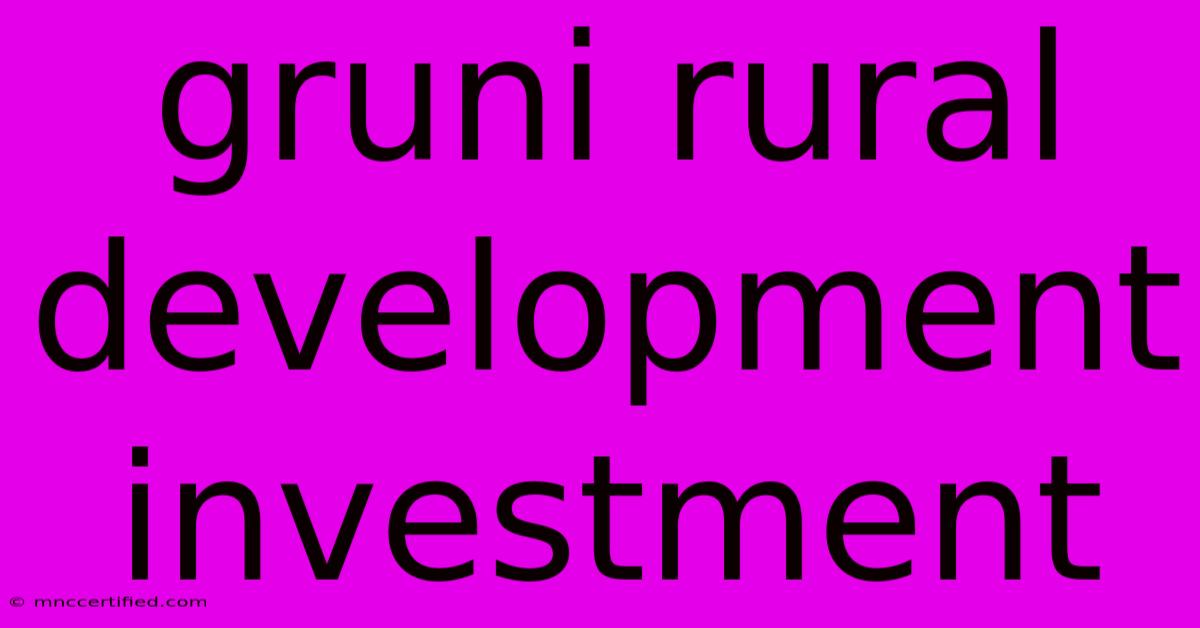Gruni Rural Development Investment

Table of Contents
Gruni Rural Development: Investing in a Brighter Future
Gruni, a region often overlooked, presents a compelling case for rural development investment. This article explores the opportunities, challenges, and potential for impactful interventions aimed at fostering sustainable growth and improving the lives of Gruni's residents. We'll delve into specific investment areas, highlighting their economic and social potential, and discussing strategies for maximizing return on investment (ROI) while ensuring environmental sustainability.
Understanding Gruni's Development Needs
Before diving into investment strategies, it's crucial to understand Gruni's unique context. This involves a comprehensive assessment of its current state, identifying key challenges and opportunities. This might include:
- Infrastructure Deficiencies: Lack of access to reliable transportation, electricity, clean water, and sanitation are common hurdles hindering economic activity and quality of life. Investing in rural infrastructure development is paramount.
- Limited Access to Education and Healthcare: Inadequate access to quality education and healthcare services limits human capital development and perpetuates cycles of poverty. Investment in education and healthcare infrastructure and programs is crucial.
- Agricultural Constraints: Many Gruni communities rely heavily on agriculture. However, outdated farming techniques, lack of access to markets, and vulnerability to climate change severely impact productivity. Investing in agricultural technology, training, and market access can significantly boost income and food security.
- Lack of Economic Diversification: Over-reliance on a single economic sector (e.g., agriculture) makes Gruni vulnerable to shocks. Promoting economic diversification through support for small and medium-sized enterprises (SMEs) in sectors like tourism, handicrafts, or renewable energy is vital.
Key Investment Areas in Gruni Rural Development
Successful rural development in Gruni requires a multi-faceted approach. Here are some key areas ripe for investment:
1. Sustainable Agriculture and Food Security
- Irrigation systems: Investing in efficient irrigation systems can enhance crop yields and reduce reliance on rainfall.
- Agricultural training and extension services: Providing farmers with access to modern farming techniques, best practices, and market information is crucial.
- Value chain development: Improving post-harvest handling, processing, and marketing can increase farmers' incomes.
- Climate-smart agriculture: Promoting climate-resilient crops and farming practices is essential for long-term sustainability.
2. Infrastructure Development
- Road infrastructure: Improved roads connect communities to markets, schools, and healthcare facilities, boosting economic activity and improving access to essential services.
- Energy access: Expanding access to electricity through renewable energy sources (solar, wind) can power businesses, improve living standards, and reduce reliance on expensive and polluting fuels.
- Water and sanitation: Investment in clean water and sanitation infrastructure is crucial for public health and improving quality of life.
3. Human Capital Development
- Education: Investing in quality education, particularly at the primary and secondary levels, is crucial for developing a skilled workforce. This includes teacher training, improved school infrastructure, and scholarships.
- Healthcare: Improved healthcare access through clinics, mobile health units, and healthcare worker training is vital for community well-being.
- Skill development programs: Vocational training programs can equip individuals with the skills needed for employment in emerging sectors.
4. Promoting Economic Diversification
- Support for SMEs: Providing access to credit, business development services, and market linkages can help SMEs thrive and create jobs.
- Tourism development: Developing eco-tourism initiatives can generate income and create employment opportunities.
- Renewable energy projects: Investing in renewable energy can create jobs, reduce reliance on fossil fuels, and improve energy security.
Measuring Success and Ensuring Sustainability
Measuring the impact of rural development investments is critical. Key performance indicators (KPIs) should include:
- Improved household incomes: Tracking changes in household income levels provides a direct measure of economic impact.
- Increased access to essential services: Monitoring access to clean water, sanitation, healthcare, and education reveals improvements in quality of life.
- Environmental sustainability: Assessing the environmental impact of development projects is crucial for long-term sustainability.
- Community participation: Ensuring community involvement in project design and implementation is essential for ownership and sustainability.
Conclusion: A Call for Collaborative Investment
Investing in Gruni's rural development is not just an economic imperative; it's a social and ethical responsibility. By adopting a holistic approach that integrates sustainable agriculture, infrastructure development, human capital development, and economic diversification, we can create a brighter future for Gruni's communities. This requires collaboration among government, private sector, NGOs, and local communities to ensure that investments are targeted, effective, and sustainable. The potential for positive change is significant – let's work together to unlock it.

Thank you for visiting our website wich cover about Gruni Rural Development Investment. We hope the information provided has been useful to you. Feel free to contact us if you have any questions or need further assistance. See you next time and dont miss to bookmark.
Featured Posts
-
Divall Insured Income Properties 2
Nov 17, 2024
-
France Wins Thriller 30 29 Vs Nz
Nov 17, 2024
-
Kingstone Insurance Company Rating
Nov 17, 2024
-
Colorado Wins Closes In Hunter Sanders Key
Nov 17, 2024
-
Duluth Trading Flannel Lined Jeans
Nov 17, 2024